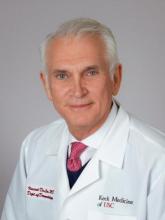At the 2020 ODAC Dermatology, Aesthetic & Surgical Conference in Orlando, Angelo Landriscina, MD, revealed how dermatologists can help their LGBTQ+ patients. Dr. Landriscina, and MDedge reporter Jeff Craven join producer Nick Andrews to discuss how dermatologists are uniquely suited to treat sexual- and gender-minority patients.
As patients are becoming more involved in their own care, physicians must stay up to date on trends such as the ketogenic (keto) diet to encourage better health and steer patients away from dangerous online advice. Dr. Vincent DeLeo spoke with Dr. Daren Fomin about benefits of the ketogenic diet for dermatologic conditions such as acne, diabetic skin diseases, and cutaneous malignancies. Dr. Fomin also provided tips for safely and effectively implementing this diet. “Coming alongside [patients] as more than just a diagnoser and treater of disease but [as a] promoter of health, I think that’s very valuable, and honestly I think that’s where medicine is moving,” Dr. Fomin said.
* * *
Things you will learn in this episode:
- Ketosis is the state of producing ketones, which is necessary to maintain proper organ function in the absence of sufficient dietary carbohydrates.
- Ketosis can be achieved through fasting; prolonged aerobic activity; certain physiologic states (e.g., pregnancy or the neonatal period); and processes such as the ketogenic diet, which tricks the body into a low glucose state that results in metabolic and cellular benefits without famine or fasting.
- Some dermatologic conditions might theoretically respond to a ketogenic diet. “From our reading of the literature, we think potential candidates would be acne, hidradenitis suppurativa, autoinflammatory syndromes, definitely diabetic skin diseases, melanoma, and perhaps other skin cancers, psoriasis, morphea, and ... obesity-related skin disease,” Dr. Fomin explained.
- Ketogenesis may provide a multiangle approach to acne treatment. Beta-hydroxybutyrate, the main ketone produced during ketogenesis, can potentially decrease or inhibit the inflammatory response in acne vulgaris. Ketogenesis also helps prevent the hyperproliferation of keratinocytes seen in acne and optimizes androgens to reduce sebum production.
- Low-carbohydrate regimens such as the ketogenic diet have been associated with risk reduction of such diabetic skin diseases as diabetic peripheral neuropathy, ulcers, acanthosis nigricans, microangiopathy, and cutaneous infections: “This is due to several known mechanisms,” Dr. Fomin noted. “Less glucose entering the body and less fat deposition as a product of that, less end-product glycation, less free radical production, enhanced fat loss and metabolic efficiency, increased insulin sensitivity, and then decreased inflammation, as well.”
- Because cancer cells from melanoma and other malignancies survive only in the presence of glycogen, there is serious potential that cancer could be “starved out” by feeding normal tissues with ketones. “Honestly, it’s my hope and kind of my optimistic thought that in 10-20 years, maybe we’ll see an increase in the number of patients being put on some sort of either endogenous or exogenous ketone therapy as an adjunct to their cancer treatments,” Dr. Fomin said. “I’d be curious to see if we can start adding this on to adjunctive melanoma therapy and see if there’s an improved outcome in our patients.”
- The ketogenic diet generally is well tolerated, but potential transient adverse effects include dehydration, acidosis, lethargy, hypoglycemia, dyslipidemia, prurigo pigmentosa, and gastrointestinal distress. Chronic side effects include nephrolithiasis and unintended weight loss.
- The ketogenic diet approach to managing skin disease takes a lot of self-motivation and work from patients. It is important to make sure patients know to expect a few days to weeks of potentially noticeable physiologic effects (e.g., hyperglycemia, lethargy) before they become adapted to the diet.
- When working with patients to initiate the ketogenic diet, dermatologists are encouraged to involve educated nutritionists if they have access to them.
* * *
Hosts: Elizabeth Mechcatie; Terry Rudd; Vincent A. DeLeo, MD (Keck School of Medicine of the University of Southern California, Los Angeles)
Guests: Angelo Landriscina, MD (George Washington University, Washington); Daren A. Fomin, DO (Walter Reed National Military Medical Center, Bethesda, Md.).
Show notes by: Alicia Sonners, Melissa Sears, Elizabeth Mechcatie
* * *
You can find more of our podcasts at www.mdedge.com/podcasts.
Email the show: podcasts@mdedge.com
Interact with us on Twitter: @MDedgeDerm

